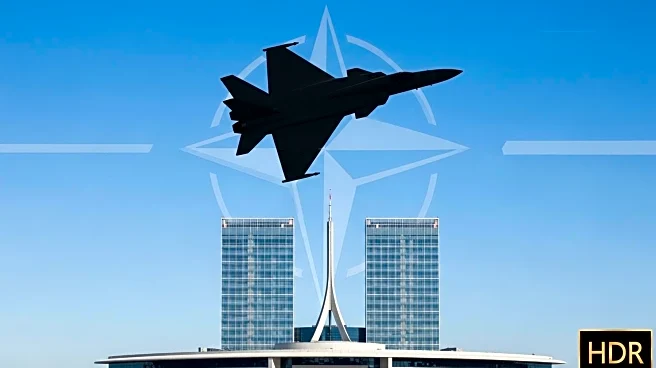What is the story about?
What's Happening?
Estonia has requested urgent NATO consultations following an incursion by Russian MiG-31 fighter jets into its airspace. The Estonian foreign ministry condemned the violation as 'brazen,' noting that the jets remained in Estonian skies for 12 minutes. NATO responded by intercepting the aircraft, with jets from Italy, Finland, and Sweden scrambled to address the situation. Russia's defense ministry denied the violation, claiming the jets were on a scheduled flight over neutral Baltic waters. Estonia's Prime Minister Kristen Michal emphasized the need for a united NATO response to such provocations.
Why It's Important?
This airspace violation by Russian jets is a significant provocation that tests NATO's resolve and unity. It highlights the ongoing tensions between NATO and Russia, exacerbated by the Ukraine conflict. The incident underscores the strategic importance of NATO's eastern flank and the need for robust air defense measures. Estonia's call for Article 4 consultations reflects the seriousness of the situation and the potential for further escalation. The incident could influence NATO's defense posture and its approach to collective security in the face of Russian aggression.
What's Next?
NATO is likely to enhance its military presence in Eastern Europe, including deploying additional fighter jets and air defense systems. The alliance will engage in consultations to determine a coordinated response to the airspace violation. Estonia's request for Article 4 discussions may lead to increased diplomatic and military support from NATO allies. The situation could prompt NATO to refine its rules of engagement and strengthen its air defense capabilities to deter future incursions. The international community will closely watch Russia's actions and NATO's response to assess the potential for further tensions.
Beyond the Headlines
The incident raises concerns about the effectiveness of current air defense systems and the need for NATO to adapt to new security challenges. It also highlights the strategic importance of NATO's eastern members and the need for collective security measures. The situation may influence NATO's future defense strategies and its approach to hybrid threats. Additionally, the incident could impact diplomatic relations within the alliance, as member states navigate differing perspectives on how to address Russian provocations.
















